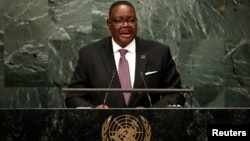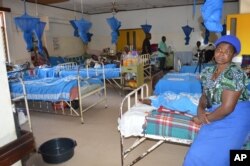President Peter Mutharika, in his national address Monday to Malawians, said his country has now acquired enough food to feed nearly half of the country's population in need of food assistance.
This is his second address to the nation since May. Many Malawians had asked the president mostly through social media to address the challenges facing the country.
Malawi is facing many challenges, including drug shortages in public hospitals, corruption and food insecurity.
Its economy declined 6.2 percent in 2014, to 3.2 percent in 2015. Recent statistics show it will decline another 2.8 percent in 2016.
Weather has not helped
Speaking on state-run media, Mutharika said Malawians should not panic because all the measures are in place to address the challenges.
“I know the pain most of us have been feeling. I also understand there is impatience to get out of the challenges because the nation has suffered in poverty for many years,” Mutharkia said. “Ladies and gentleman, the challenges we are facing are not insurmountable; with unity and purpose, we can overcome them."
Malawi is experiencing its worst food insecurity problem in a decade. Experts say this is largely because of the El Nino weather phenomenon, which caused drought and floods that affected crops over the past two years.
A recent report from the Malawi Vulnerability Assessment Committee shows that 6.7 million Malawians are in dire need of food assistance. This is nearly half of Malawi's population.
Mutharika said no Malawian will die of hunger.
"We have bought enough maize and other food stuffs to be given for free to the poorest and most vulnerable people who cannot afford to buy food," he said.
Solution has two parts
The president said the government and its development partners have developed a nearly $400 million food insecurity plan to guide the response program from 2016 to 2017.
“The response has two modalities,” Mutharika said. “In-kind food transfer, targeting 4,751,862 people, and cash transfers, targeting 1,734,806 people."
Mutharika said his government is working with development partners to address the drug shortage problems and end corruption in the country.






